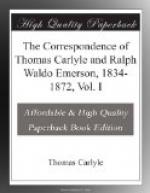Have I involved you in double postage by this loquacity? or What is your American rule? I did not intend it when I began; but today my confusion of head is very great and words must be multiplied with only a given quantity of meaning.
My wife, who is just gone out to spend the day with a certain “celebrated Mrs. Austin,” (called also the “celebrated Translatress of Puckler-Muskau,”) charged me very specially to send you her love, her good wishes and thanks: I assure you there is no hypocrisy in that. She votes often for taking the Transatlantic scheme into contemplation; declares farther that my Book and Books must and will indisputably prosper (at some future era), and takes the world beside me—as a good wife and daughter of John Knox should. Speaking of “celebrated” persons here, let me mention that I have learned by stern experience, as children do with fire, to keep in general quite out of the way of celebrated persons, more especially celebrated women. This Mrs. Austin, who is half ruined by celebrity (of a kind), is the only woman I have seen not wholly ruined by it. Men, strong men, I have seen die of it, or go mad by it. Good fortune is far worse than bad!
Will you write with all despatch, my dear sir; fancy me a fellow-wayfarer, who cordially bids you God-speed, and would fain keep in sight of you, within sound of you.
Yours with great sincerity,
T.
Carlyle
V. Emerson to Carlyle
Concord, 12 March, 1838
My Dear Sir,—I am glad of the opportunity of Mr. Barnard’s* visit to say health and peace be with you. I esteem it the best sign that has shone in my little section of space for many days, that some thirty or more intelligent persons understand and highly appreciate the Sartor. Dr. Channing sent to me for it the other day, and I have since heard that he had read it with great interest. As soon as I go into town I shall see him and measure his love. I know his genius does not and cannot engage your attention much. He possesses the mysterious endowment of natural eloquence, whose effect, however intense, is limited, of course, to personal communication. I can see myself that his writings, without his voice, may be meagre and feeble. But please love his catholicism, that at his age can relish the Sartor, born and inveterated as he is in old books. Moreover, he lay awake all night, he told my friend last week, because he had learned in the evening that some young men proposed to issue a journal, to be called The Transcendentalist, as the organ of a spiritual philosophy. So much for our gossip of today.




